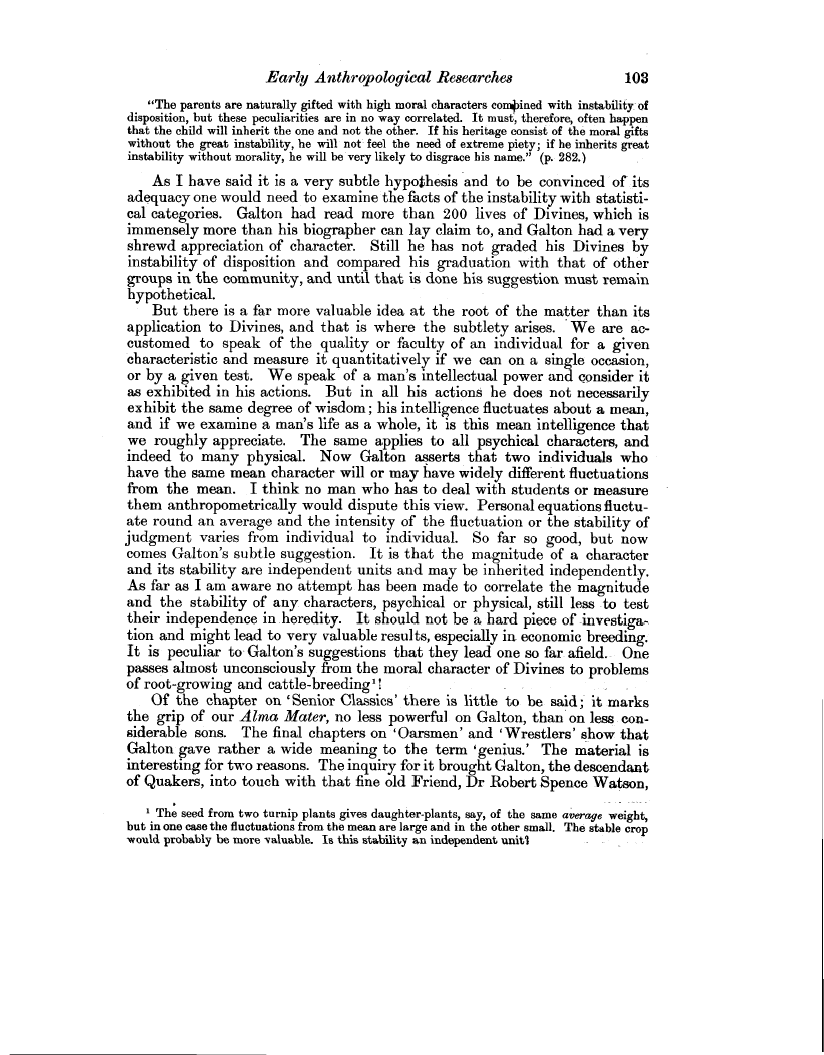Early Anthropological Researches 103
"The parents are naturally gifted with high moral characters com$ined with instability of disposition, but these peculiarities are in no way correlated. It must, therefore, often happen that the child will inherit the one and not the other. If his heritage consist of the moral gifts without the great instability, he will not feel the need of extreme piety; if he inherits great instability without morality, he will be very likely to disgrace his name." (p. 282.)
As I have said it is a very subtle hypothesis and to be convinced of its adequacy one would need to examine the facts of the instability with statistical categories. Galton had read more than 200 lives of Divines, which is immensely more than his biographer can lay claim to, and Galton had a very shrewd appreciation of character. Still he has not graded his Divines by instability of disposition and compared his graduation with that of other groups in the community, and until that is done his suggestion must remain hypothetical.
But there is a far more valuable idea at the root of the matter than its application to Divines, and that is where the subtlety arises. We are accustomed to speak of the quality or faculty of an individual for a given characteristic and measure it quantitatively if we can on a single occasion, or by a given test. We speak of a man's intellectual power and consider it as exhibited in his actions. But in all his actions he does not necessarily exhibit the same degree of wisdom; his intelligence fluctuates about a mean, and if we examine a man's life as a whole, it is this mean intelligence that we roughly appreciate. The same applies to all psychical characters, and indeed to many physical. Now Galton asserts that two individuals who have the same mean character will or may have widely different fluctuations from the mean. I think no man who has to deal with students or measure them anthropometrically would dispute this view. Personal equations fluctuate round an average and the intensity of the fluctuation or the stability of judgment varies from individual to individual. So far so good, but now comes Galton's subtle suggestion. It is that the magnitude of a character and its stability are independent units and may be inherited independently. As far as I am aware no attempt has been made to correlate the magnitude and the stability of any characters, psychical or physical, still less to test their independence in. heredity. It should not be a hard piece of -investiga. tion and might lead to very valuable results, especially in economic breeding. It is peculiar to- Galton's suggestions that they lead one so far afield. One passes almost unconsciously from the moral character of Divines to problems of root-growing and cattle-breeding"
Of the chapter on `Senior Classics' there is little to be said ; it marks the grip of our Alma Mater, no less powerful on Galton, than on less considerable sons. The final chapters on `Oarsmen' and `Wrestlers' show that Galton gave rather a wide meaning to the term `genius.' The material is interesting for two reasons. The inquiry for it brought Galton, the descendant of Quakers, into touch with that fine old Friend, Dr Robert Spence Watson,
' The seed from two turnip plants gives daughter-plants, say, of the same average weight, but in one case the fluctuations from the mean are large and in the other small. The stable crop would probably be more valuable. Is this stability an independent unit'

